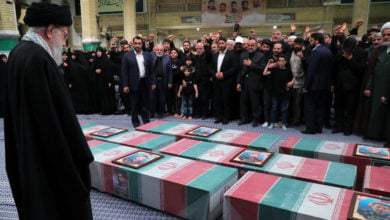On April 10, 2003, the day after the fall of Baghdad to U.S troops, Bush administration official John Bolton told the media, “Iran, Syria and North Korea should learn the lesson of Iraq.”
There was no mystery about what Bolton meant: If you do not bow before the empire, we will sanction you, attempt to starve your people, and, if that does not work, use our vast military power to achieve “regime change” in your countries. Objectively speaking, his words amount to a terrorist threat of the highest magnitude.
What kept the U.S. war machine from quickly moving on to its other named targets was the fierce Iraqi resistance to occupation.
Now, as the Syria conflict that began in March 2011 reaches a critical stage, the Obama administration and its allies are sharply escalating their intervention. Syria was hardly mentioned during the presidential campaign because the candidates understood that most voters wanted to hear no talk of a new war.
Immediately after Election Day, however, U.S. clients stepped up arms shipments to the rebel forces, U.S. warships – including the nuclear-powered aircraft carrier USS Eisenhower – moved to the Syria coast, Hillary Clinton announced plans to reorganize the disparate Syrian opposition, and the Pentagon sent new Patriot missile units manned by 400 U.S. troops to the Syria-Turkey border.
Look who’s talking about human rights
U.S. government and allied officials pretend that concerns about human rights and democracy are motivating their escalated intervention. This would be a laughable claim were it not so dangerous; the mass corporate media is echoing this propaganda 24/7 as a way to conceal these governments’ real aims and neutralize anti-war sentiment.
In the media’s docile coverage of U.S. policymakers, a phenomenon that precedes all U.S. interventions, it is as if the wars on Iraq and Afghanistan never happened, never claimed over 1 million lives, while wounding and displacing many millions more. The U.S. “human rights record” includes hundreds of billions in aid to the apartheid colonial state of Israel. Earlier U.S. wars in Vietnam and Korea left more than 7 million dead. And the list goes on and on in Africa, Asia, Latin America and the Balkans.
The chief allies of the U.S. government are Britain and France, the former colonizers of the Middle East and much of the world. Their main Arab allies are Saudi Arabia and Qatar, where Clinton presided over the reorganization of the Syrian opposition.
Qatar, which has been also been arming the Syrian opposition, is an absolute monarchy under the super-rich al-Thani ruling family. Ninety-four percent of all workers and 80 percent of the total population of Qatar are migrants, most from South Asia and the Philippines. These migrant workers have essentially no rights, suffer frequent abuse, and are legally barred from unionizing or striking.
Saudi Arabia, another absolute hereditary monarchy and police state, has never had an election and forbids women from driving cars.
Turkey, which is playing a key role in the anti-Syria alliance, suppresses the largest Kurdish population in the world, more than 18 million people.
Given these countries’ own criminal rap sheets, it is simply impossible that the desire for “democracy” is driving their intervention into Syria’s civil conflict.
Syria and U.S. global strategy
Since the end of World War II in 1945, the U.S. ruling class has sought to ensure the United States position as the dominant world power, standing above all others. Today the U.S. empire is the biggest in history, as it demonstrates with over 900 military bases covering every populated continent.
The key elements in the U.S. strategy of domination included: 1) U.S. military superiority in nuclear and conventional weaponry; 2) Control of newly-created international institutions like the United Nations, International Monetary Fund and World Bank; 3) The establishment of the dollar as the world currency and U.S. economic supremacy; and 4) Control of global resources, particularly oil.
Soon after WWII, it became known that the Middle East region held up to two-thirds of the world’s oil resources. This fact, and the region’s strategic position as a crossroads between Asia, Africa and Europe, made the Middle East a prime target.
There have been 12 presidential administrations since WWII, half Democrats and half Republicans. Some have had specific “doctrines” for the Middle East: the Truman Doctrine, Eisenhower Doctrine, Nixon Doctrine, Carter Doctrine, etc. But regardless of the name of the doctrine, or whether it was a Republican or Democrat sitting in the White House, the strategic objective has changed very little: U.S. supremacy in the region.
Throughout this period, the big banks, oil companies and military-industrial corporations – which constitute the core of U.S. ruling class power – have all reaped immense profits from exploiting the Middle East.
In order to ensure their domination, a central element of U.S. policy has been to weaken, and ultimately destroy, all independent states and popular movements in the area. In the period of anti-colonial struggle that followed the WWII, the CIA relentlessly sought – and often succeeded – to undermine and overthrow nationalist governments that tried to use their countries’ resources for independent development.
This is the real historical context for the present U.S.-led drive to overthrow the government in Syria. Imperialist-orchestrated “regime change” would open the country to foreign domination, to the detriment of the Syrian people. It would weaken the position of Iran – also in the imperialist crosshairs – and of the popular movements in Lebanon and Palestine.
Washington has collaborated with and used the Syrian regime off and on over the years, while always recognizing that it is part of the anti-colonial axis in the region. If it had not been for the Arab Spring, the U.S. government would not be so enthusiastic about accelerating regime change. But once the Syrian rebels began the revolt against the Syrian state, the inherent link between imperialism and counter – revolutionary movements everywhere became a compass for U.S. policy.
All progressive-minded people here should demand an end to U.S. intervention in Syria and the entire Middle East. U.S. Hands off Syria!






